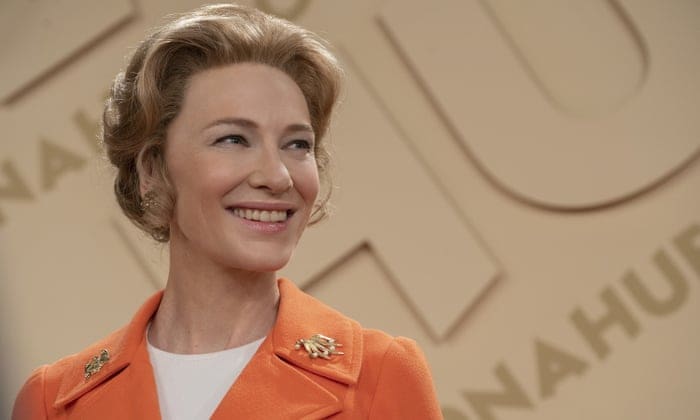As we’ve all spent the year sitting in our living rooms mourning the loss of simpler times, TV has served dual purposes: either as escapism to show us that not everything is terrible; or as a lovely reminder that everything is, indeed, terrible, thank you very much. Somewhere at a strange intersection between these purposes is FX’s historical drama Mrs America, which dramatises the political battle over the Equal Rights Amendment (ERA) in the US during the 70s. The affirmative side of the debate is explored through the political activity of second-wave feminists, especially the impossibly cool Gloria Steinem (Rose Byrne). Meanwhile, the conservative opposition to the amendment is mainly expressed through the character of Phyllis Schlafly (Cate Blanchett), an especially active anti-ERA activist and founder of the conservative group Eagle Forum.
Mrs America’s combination of stellar performances, uplifting feminist rhetoric and a gorgeous 70s aesthetic drew critical acclaim upon its release. But amidst this praise (and a claim of historical inaccuracy by Gloria Steinem herself), came social media backlash concerning the character of Phyllis Schlafly. Many viewers felt that the emphasis placed on Schlafly’s storyline, in some cases over the feminist activists she opposed, humanised her so much that she was likely to be considered a sympathetic character or an antihero by viewers. By extension of this, Schlafly’s perspective was explored somewhat more thoroughly, giving her and her anti-feminist, conservative ideas an undue platform.
It is true that, amongst its criticisms of her ideology, Mrs America makes a point of humanising Phyllis Schlafly, who remained a prominent conservative political figure in America until her death in 2016 (before which she published a book called The Conservative Case for Trump.). Cate Blanchett’s performance is incredible, but her presence does lend Schlafly a certain campy, glamorous quality, so much so that her pastel suits and sculpted blonde hair seem almost fabulous instead of stuffy and uptight. Subtle shots of Schlafly’s discomfort listening to male politicians sexualise their secretaries, or her simmering resentment of her husband’s constant undermining of her ambition, also show her as being on an equal footing to her feminist counterparts. That is, as being a woman who is not so exceptional that she is immune to misogyny, no matter how much she tries to deny it. In many ways, it is valid to criticise this humanisation of a figure who opposed the very idea of women having equal rights to men, especially considering that the ERA was never ratified at least in part due to the vehement opposition of Schlafly and her associates.
But is the humanisation of Phyllis Schlafly ultimately a bad thing? The main ‘types’ that represent conservatives are usually reduced to the gun-toting redneck, the timid housewife, the arrogant male politician, all of whom are considered by many to be some combination of ignorant, uneducated and stupid. As much as she is undoubtedly ignorant, Schlafly’s almost inconspicuous persona as a college educated, intelligent housewife contrasts the representation of these archetypes throughout the show. It is exactly this complexity in her character that made her such a formidable political figure, who could go from persuading housewives at the hair salon that the ERA would make their daughters eligible for the draft to a meeting room in the White House on the same day. The representation of such a unique conservative figure as being a human being instead of a soulless, ruthless monster should remind viewers that sometimes the most crazy, gun-loving, rights-denying conservatives are the nice middle aged lady living down the street.
Mrs America’s portrayal of Phyllis Schlafly’s suffering under the patriarchy despite her best efforts to reinforce it also represents the universality of misogyny. The viewer’s insights into Schlafly’s personal life reveal her hunger for political power, using the anti-ERA campaign as her vehicle into Cold War politics. Throughout the show, the audience watches her smile through meetings with senators where she is mistaken for a secretary, walk in bikini pageants as “Mrs Fred Schlafly”, and be continuously repressed by her husband. But at the end of the last episode, she’s sitting alone in her kitchen, having lost her political dreams, peeling apples to make an apple pie. As Elizabeth Banks’ character Jill Ruckelshaus said: “you wanna get ahead climbing on the shoulders of men? Fine. Just know they’re looking up your skirt”.





